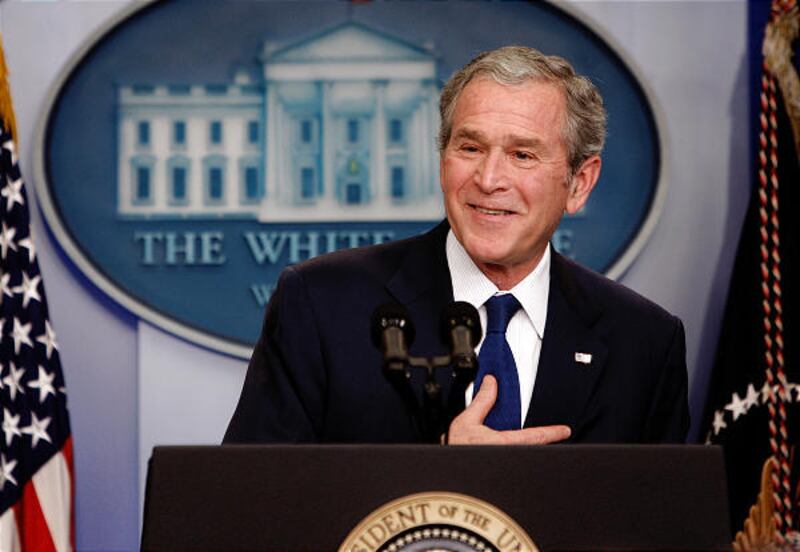WASHINGTON — With rare public emotion, George W. Bush sat in judgment on his controversial, consequential presidency on Monday, lamenting mistakes but claiming few as his own, heatedly defending his record on disasters in Iraq and at home and offering kindly advice to a successor who won largely because the nation ached for something new.
By turns wistful, aggressive and joking in his final news conference, Bush covered a huge range of topics in summing up his eight years in
the White House — the latest in a recent string of efforts to have his say before historians have theirs. Then the White House said he would do it again Thursday night in a final address to the nation.
Reaching back to his first day in office, he recalled walking into the White House and having "a moment" when he felt all the responsibilities of the job landing on his shoulders. Barack Obama will feel that next week, he said, his tone gently understanding.
Indeed, he was full of supportive words for Obama — the nation's first black president — and talked of being deeply affected while watching people say on television that they never thought they would see such a day, many with "tears streaming down their cheeks when they said it."
"President-elect Obama's election does speak volumes about how far this country has come when it comes to racial relations," Bush said, seeming almost awe-struck.
At the same time, Bush showed his skin is not so thick as all that. "Sometimes the biggest disappointments will come from your so-called friends," he advised Obama. Bush's former press secretary, Scott McClellan, released a scathing tell-all book last year that still stings around the West Wing.
Asked one last time by reporters about the major controversies of his presidency, Bush had a ready answer for each:
• On the dismal economy he leaves behind for Obama, Bush said, "I inherited a recession, I'm ending on a recession. In the meantime, there were 52 months of uninterrupted job growth." The 2001 recession began in March, two months into his presidency, but economists agree the seeds were sown long before.
• On the five-year-old Iraq war, the issue that will define his presidency, Bush said history will judge his actions but it is a fact that violence diminished and everyday life became more stable after his decision in 2007 to send an additional 30,000 American troops into the fight.
• He vigorously took issue with critics of the federal response to Katrina, the hurricane that devastated New Orleans. Gesturing and speaking with feeling, he said, "Don't tell me the federal response was slow when there were 30,000 people pulled off roofs right after the storm passed," he said.
• The president claimed progress toward peace in the Middle East, though any hopes for an accord soon have been dashed by, among other things, a bruising offensive by Israel in the Gaza Strip.
• Most angrily, Bush dismissed "some of the elite" who say he has damaged America's image around the world. "No question, parts of Europe have said that we shouldn't have gone to war in Iraq without a mandate, but those are few countries," he said.
"In terms of the decisions that I had made to protect the homeland, I wouldn't worry about popularity," he said.
Asked about mistakes, Bush cited a few that he preferred to term "disappointments" — not finding those weapons of mass destruction in Iraq, the abuses committed by members of the U.S. military at the Abu Ghraib detention center in Iraq, giving a speech two months after the start of the Iraq war under a "Mission Accomplished" banner on an aircraft carrier, Congress' failure to pass free-trade agreements with Colombia, Panama and South Korea, and the negative tone in Washington that belied his 2000 campaign promise to be a "uniter not a divider."
But he offered no evidence he takes personal responsibility for any of those failures. The only two areas where he seemed to acknowledge that errors in judgment had been his were his penchant for cowboy rhetoric, such as saying "Bring 'em on!" to foes in Iraq, and his decision to pursue partial privatization of Social Security immediately after his 2004 re-election.
Bush began what he termed "the ultimate exit interview" Monday with a lengthy and gracious thank-you to his core of usual reporters, calling many by name and saying he respects their work even if he often dislikes the product.
Looking to his first day out of office, Bush appeared somewhat flummoxed but also relieved at the prospect of waking up at his Texas ranch next Wednesday with, by his own admission, little idea what to do beyond bringing coffee to his wife.
Monday's news conference offered only one bit of news, and — in these times when Bush has seemed to fade from office a little more each day — even that was overtaken by events.
He said he would ask Congress to release the remaining $350 billion in Wall Street bailout money if Obama wants him to — but that Obama had not yet asked. A mere two hours later, Obama had made his request to Bush, and the White House said the president had agreed.
Bush farewell
The president's farewell address to the nation is set for 6 p.m. Thursday.


